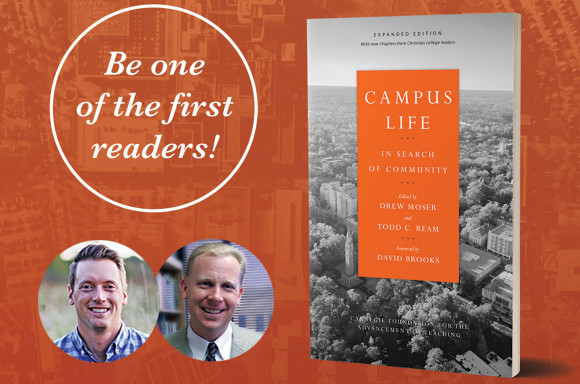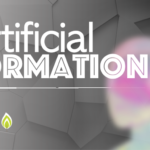In recent years, more and more of our ACSD peers have—in addition to their professional responsibilities—helped define and defend the work of Christian student development through research and writing. ACSD members have been published in academic journals (e.g. Journal of Christian Higher Education, Journal of College and Character, Growth), online here at ACSD Ideas, and in a number books (e.g. Diversity Matters, A Calling to Care, and A Faith for the Generations).
Today we have the opportunity to learn more about another resource set for release at ACSD 2019—the forthcoming updated and expanded edition of Ernest Boyer’s classic work entitled Campus Life: In Search of Community.
Today’s post is an interview with the book’s co-editor, and our very own scholarship chair, Drew Moser.
WHO IS ERNEST BOYER? WHAT IMPACT HAS HE HAD ON HIGHER EDUCATION?
Ernest L. Boyer (1928-1995) was a graduate of two Christian colleges (Messiah and Greenville). Boyer was an educational innovator, reformer, and arguably the most respected voice on education in the 1980s and 1990s. He was Chancellor of the State University of New York (SUNY) system, Commissioner of Education under U.S. President Jimmy Carter, and President of the Carnegie Foundation for the Advancement of Teaching (CFAT). His book Scholarship Reconsidered: Priorities of the Professoriate, though published in 1990, continues to be one of the bestselling higher education texts of all time.
In 1990, Boyer and his associates at CFAT published another profound work entitled Campus Life: In Search of Community. This report was the result of a yearlong, nationwide survey of college presidents and chief student development officers. Boyer and his associates at CFAT sought to understand (and combat) the “breakdown of civility” on America’s college campuses. In just under 70 pages of wise counsel (with the remaining pages including data, tables, notes, etc.), Campus Life is organized into chapters entitled:
- A Purposeful Community
- An Open Community
- A Just Community
- A Disciplined Community
- A Caring Community
- A Celebrative Community
WHAT DOES A REPORT PUBLISHED IN THE 1990’S HAVE TO SAY TO CHRISTIAN HIGHER EDUCATION IN 2019?
Christian higher education stands at a critical point in its history. Many institutions face declining enrollments, escalating discount rates, fractured faculties, increased mental health needs, and ideological clashes over theology, politics, and culture. These colleges and universities, once considered bastions of evangelicalism, are emerging as battlegrounds in a new chapter of the long-standing culture wars, a tension that proved particularly palpable during the 2016 U.S. presidential election.
An unfortunate casualty of such tumult is the peaceful campus life many institutions took for granted. Racial tensions, financial troubles, and controversies surrounding social issues now continue to threaten the social fabric of these historically small, tightknit institutions. Leaders of Christian colleges and universities must reflect upon what led their institutions to this precipice and, in turn, cast a new vision for campus life. We believe the six themes of community provided in the original 1990 report are just as important and relevant today and have the potential to help us engage the critical issues we encounter today.
HOW DID YOU EXPAND THE ORIGINAL WORK? WHAT DOES CHRISTIAN HIGHER EDUCATION HAVE TO OFFER TO THE HIGHER EDUCATION COMMUNITY?
I’ve edited (along with my colleague Todd C. Ream) this expanded edition. We’ve also included a poignant and thoughtful forward by New York Times columnist David Brooks. This edition also contains essays by some of Christian higher education’s leading chief academic officers and chief student development officers in an effort to aid in the process of reconsidering and translating the ideas found in Campus Life.
The essays in this edition offer a context in which readers can reflect upon the past while also thinking critically about the prospects for the future of campus life at Christian colleges. The contributors explore questions such as:
How can the curricular and co-curricular realms of institutions work more effectively
together to foster a learning environment that develops whole people?
How can Christian campuses serve as laboratories for justice?
Amid the current cultural climate, how can Christian college and university campuses embody convicted civility?
How can Christian campuses model forms of community that seek individual flourishing and the common good?
What is an appropriate and Biblical ethic of care toward today’s students and faculty?
How does one honor campus traditions while also embracing change?
WHAT ARE SOME WAYS THIS BOOK CAN HELP CULTIVATE OUR IMAGINATION AND EFFECTIVENESS AS STUDENT DEVELOPMENT PROFESSIONALS?
I think this book can help in four main ways. This book can help professionals:
- Explore the challenge of the fraying of the communal fabric that long defined Christian colleges and universities and promote helpful ways forward.
- Cultivate a theologically informed vision of community to help frame conversations in light of the general call to Christian discipleship.
- Discover effective partnerships with academic affairs which help cultivate campus community.
- Learn from the practical wisdom of our peers who are wrestling with the most pressing issues of the day.
To learn more about this book you can visit ivpress.com/campus-life. Copies will be available at ACSD19.






